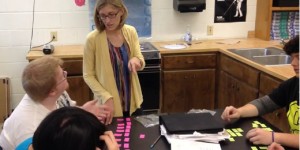When Megan Bennett decided to return to teaching after a 6-year hiatus, she wanted to translate her love of biology and energy for students into a new experience in the classroom. She found just what she was looking for in an alternative licensure program focused on science, technology, engineering and mathematics (STEM) known as NC STEP — the North Carolina STEM Teacher Education Program at NC New Schools/Breakthrough Learning.
Bennett, now in her second year as a teacher at Southern High School in Durham, brings new approaches to teaching that have re-invigorated and changed her classroom practice. She attributes her success to the support she’s received from both NC STEP and her co-workers at the school.
“I felt like was learning how to teach all over again,” Bennett says of her experience in NC STEP. “That was important because the old way of teaching in the 1990s was so different from teaching now. Before, I was more or less teaching to the test. The way I teach now – where every student gets to read, write, think, talk in every class every day – they will remember forever.”
Students who think independently and can justify their thinking – that’s Bennett’s goal now. To put that ideal into practice in her classroom, she turns to approaches she explored further during her own summer learning. After her first year back in the classroom, Bennett was accepted in two additional professional learning programs: the Biology Modeling Institute at The Science House at NC State and an externship with Syngenta through NC New Schools/Breakthrough Learning. The programs built on ideas she’d learned about as an NC STEP intern.
Hands-on science
“Modeling is a way to bring hands-on learning to students,” Bennett says, referencing the 3-week Biology Modeling Institute. “This type of learning has transformed my classroom.”
The technique relies on a guided inquiry approach to support student learning, where students create and apply conceptual models of natural phenomena to understand and “do” science. They engage in scientific discourse to explain and justify their models and to reach class consensus on science understandings. Bennett is implementing the approach in her own class in addition to sharing across her department as they co-plan lessons this year.
Connections with industry
Empowering students through modeling is part of Bennett’s insistence on high expectations for all students. She translated that same belief into a 3-day lesson she created following her summer externship at Syngenta, where she had explored the ethics of genetically modified crops.
“This experience was life-changing,” Bennett says of her time at Syngenta. “I want my students to have the same opportunity.”
Bennett encourages discussion in her classroom and has created an atmosphere where students feel safe expressing opinions. Her students trust her, she says, and know that in her classroom, the focus is on learning, no one laughs at you and there are no wrong answers. Instead of telling students they are wrong, Bennett encourages them to justify their answers and to question one another.
“It’s an ethical issue,” Bennett says. “If you are going to be against it, be educated about why. Tell me why. Give other solutions.”
Using this approach, Bennett has found that students who struggle early in the semester are soon able to have informed discussions and provide reasoning for their own thinking. This, Bennett says, is her biggest success.
Professional networking
These and other professional learning opportunities through NC STEP changed Bennett’s approach to teaching. But just as important as the coursework and summer experiences were the supports and relationships she built through the program.
“The first time I taught, I was trying to do lateral entry on my own through the community college and wasn’t part of a cohort,” Bennett says, noting that she missed having supports once she entered the classroom.
After her NC STEP cohort completed the program and started teaching, the group continued to support each other and share ideas about their teaching practices. The power of the cohort draws from the diverse experiences of the teachers as they share their experiences, encourage each other and embrace the Design Principle of redefined professionalism. This network, along with regular check-ins from NC New Schools/Breakthrough Learning staff and coaches, provides Bennett with the support she wanted to successfully return to teaching.
For those just beginning with their NC STEP cohort, Bennett offers this advice: “Be open. Be open to all the possibilities.”


























